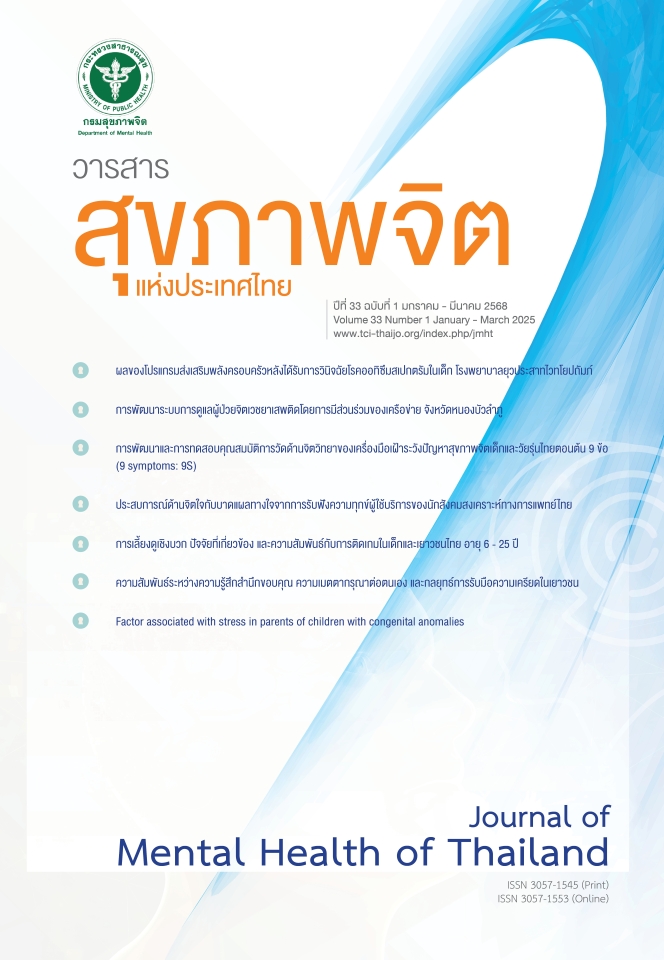ปัจจัยที่มีผลต่อความเครียดของผู้ปกครองของเด็กที่มีความผิดปกติแต่กำเนิด
DOI:
https://doi.org/10.64838/jmht.2025.273259คำสำคัญ:
ความเครียด, ความผิดปกติแต่กำเนิด, ผู้ปกครองบทคัดย่อ
วัตถุประสงค์ : เพื่อประเมินระดับความเครียดและปัจจัยที่เกี่ยวข้องของผู้ปกครองเด็กที่มีความผิดปกติแต่กำเนิด
วิธีการ : การศึกษาแบบภาคตัดขวางในผู้ปกครองของเด็กอายุ 1 เดือนถึง 12 ปีที่มีความพิการแต่กำเนิดและเข้ารับการรักษาที่โรงพยาบาลนพรัตนราชธานีระหว่างเดือนเมษายน พ.ศ. 2566 ถึง มีนาคม พ.ศ. 2567 โดยผู้ปกครองต้องสามารถอ่านและเขียนภาษาไทยได้ วัดระดับความเครียดด้วยเครื่องมือ parenting stress index - fourth edition - short form (PSI-4-SF) ฉบับภาษาไทย นำเสนอข้อมูลพื้นฐานและระดับความเครียดด้วยสถิติเชิงพรรณนา วิเคราะห์ความสัมพันธ์ระหว่างปัจจัยต่าง ๆ และความเครียดด้วย odds ratio
ผล : กลุ่มตัวอย่าง 30 คน ร้อยละ 6.7 มีความเครียดสูงกว่าระดับปกติ และร้อยละ 23.3 มีความเครียดระดับรุนแรง กลุ่มที่มีแนวโน้มระดับความเครียดสูงถึงรุนแรง ได้แก่ ผู้ปกครองที่มีการศึกษาต่ำ อาศัยอยู่โดยไม่มีคู่ชีวิต ว่างงาน และขาดแหล่งสนับสนุน รวมถึงผู้ปกครองของเด็กที่อายุมากกว่า 1 ปี ได้รับการวินิจฉัยครั้งแรกหลังคลอด และรักษาตัวในโรงพยาบาลเป็นระยะเวลานาน อย่างไรก็ตาม ไม่พบปัจจัยเสี่ยงของความเครียดระดับสูงถึงรุนแรงที่มีนัยสำคัญทางสถิติ
สรุป : ผู้ปกครองเด็กที่มีความพิการแต่กำเนิดมีความเครียดสูงกว่าผู้ปกครองเด็กทั่วไป ควรมีการคัดกรองและให้การดูแลโดยเน้นปัจจัยที่สามารถปรับเปลี่ยนได้ โดยเฉพาะในช่วงขวบปีแรกของเด็ก เพื่อช่วยลดความเครียดของผู้ปกครองและครอบครัว
Downloads
เอกสารอ้างอิง
European Registry of Congenital Anomalies and Twins. EUROCAT Description of the Congenital Anomaly Subgroups (vs.31.05.2022) [Internet]. Luxembourg: European commision; 2022 [cited 2022 Sep 1]. Available from: https://eu-rd-platform.jrc.ec.europa.eu/eurocat/data-collection/guidelines-for-data-registration_en
Golfenshtein N, Hanlon AL, Deatrick JA, Medoff-Cooper B. Parenting stress in parents of infants with congenital heart disease and parents of healthy infants: the first year of life. Compr Child Adolesc Nurs. 2017;40(4):294-314. DOI: https://doi.org/10.1080/24694193.2017.1372532
Jaschinski C, Knetsch V, Parzer P, Meyr J, Schroeder B, Fonseca E, et al. Psychosocial impact of congenital heart diseases on patients and their families: a parent's perspective. World J Pediatr Congenit Heart Surg. 2022;13(1):9-15. DOI: https://doi.org/10.1177/21501351211044127
Chinchai S, Trevittaya P, Rattakorn P, Sonsuwan N, Khwanngern K, Lekmool S. Feeding problems and treatment in cleft lip and cleft palate children. Journal of Associated Medical Sciences. 2017;50(3):533-43. (in Thai)
Al-Akour NA, Khader YS, Hamlan A. Stress among parents of infants with neural tube defect and its associated factors. Int J Nurs Pract. 2013;19(2):149-55. DOI: https://doi.org/10.1111/ijn.12049
Urichuk M, Singh C, Zrinyi A, Lum Min SA, Keijzer R. Mental health outcomes of mothers of children with congenital gastrointestinal anomalies are similar to control mothers: a longitudinal retrospective cohort study. J Pediatr Surg. 2024;59(5):918-23. DOI: https://doi.org/10.1016/j.jpedsurg.2024.01.011
Roorda D, van der Steeg AFW, van Dijk M, Derikx JPM, Gorter RR, Rotteveel J, et al. Distress and post-traumatic stress in parents of patients with congenital gastrointestinal malformations: a cross-sectional cohort study. Orphanet J Rare Dis. 2022;17(1):353. DOI: https://doi.org/10.1186/s13023-022-02502-7
Skreden M, Skari H, Malt UF, Haugen G, Pripp AH, Faugli A, et al. Long-term parental psychological distress among parents of children with a malformation—a prospective longitudinal study. Am J Med Genet A. 2010;152(9):2193-202. DOI: https://doi.org/10.1002/ajmg.a.33605
Golfenshtein N, Srulovici E, Medoff-Cooper B. Investigating parenting stress across pediatric health conditions - a systematic review. Compr Child Adolesc Nurs. 2016;39(1):41-79. DOI: https://doi.org/10.3109/01460862.2015.1078423
Lemacks J, Fowles K, Mateus A, Thomas K. Insights from parents about caring for a child with birth defects. Int J Environ Res Public Health. 2013;10(8):3465-82. DOI: https://doi.org/10.3390/ijerph10083465
Mazer P, Gischler SJ, Koot HM, Tibboel D, Van Dijk M, Duivenvoorden HJ. Impact of a child with congenital anomalies on parents (ICCAP) questionnaire; a psychometric analysis. Health Qual Life Outcomes. 2008;6:102. DOI: https://doi.org/10.1186/1477-7525-6-102
Roach MA, Orsmond GI, Barratt MS. Mothers and fathers of children with Down syndrome: parental stress and involvement in childcare. Am J Ment Retard. 1999;104(5):422-36. DOI: https://doi.org/10.1352/0895-8017(1999)104<0422:MAFOCW>2.0.CO;2
Srikosai S, Moanchai P, Kamfou C, Taweewattanaprecha S, Saipanish R. Validity and reliability of the parenting stress index of children aged 1 month to 12 years. Journal of Mental Health of Thailand. 2020;28(1):56-71. (in Thai)
Dua'a F, Kawafha MM, Abdullah KL, Shawish NS, Kamel AM, Basyouni NR. Psychological problems among parents of children with congenital anomalies. J Neonatal Nurs. 2023;29(6):846-50. DOI: https://doi.org/10.1016/j.jnn.2023.07.005
Fonseca A, Nazaré B, Canavarro MC. Parental psychological distress and quality of life after a prenatal or postnatal diagnosis of congenital anomaly: a controlled comparison study with parents of healthy infants. Disabil Health J. 2012;5(2):67-74. DOI: https://doi.org/10.1016/j.dhjo.2011.11.001
Le Gouëz M, Alvarez L, Rousseau V, Hubert P, Abadie V, Lapillonne A, et al. Posttraumatic stress reactions in parents of children esophageal atresia. PLoS One. 2016;11(3):e0150760. DOI: https://doi.org/10.1371/journal.pone.0150760
Öst E, Nisell M, Frenckner B, Mesas Burgos C, Öjmyr-Joelsson M. Parenting stress among parents of children with congenital diaphragmatic hernia. Pediatr Surg Int. 2017;33(7):761-9. DOI: https://doi.org/10.1007/s00383-017-4093-4
Peters NJ, Kaur K, Dogra S, Kaur R, Malik MA, Solanki S, et al. Factors affecting stress levels in parents of surgical neonates: A prospective observational study. J Pediatr Surg. 2022;57(12):870-5. DOI: https://doi.org/10.1016/j.jpedsurg.2022.07.013
Aite L, Trucchi A, Nahom A, Zaccara A, La Sala E, Bagolan P. Antenatal diagnosis of surgically correctable anomalies: effects of repeated consultations on parental anxiety. J Perinatol. 2003;23(8):652-4. DOI: https://doi.org/10.1038/sj.jp.7210992
Pope AW, Tillman K, Snyder HT. Parenting stress in infancy and psychosocial adjustment in toddlerhood: a longitudinal study of children with craniofacial anomalies. Cleft Palate Craniofac J. 2005;42(5):556-9. DOI: https://doi.org/10.1597/04-066r.1
Hunfeld JA, Tempels A, Passchier J, Hazebroek FW, Tibboel D. Brief report: parental burden and grief one year after the birth of a child with a congenital anomaly. J Pediatr Psychol. 1999;24(6):515-20. DOI: https://doi.org/10.1093/jpepsy/24.6.515
Calero Plaza J, Grau Sevilla MD, Martínez Rico G, Morales Murillo CP. Parenting stress and coping strategies in mothers of children receiving early intervention services. J Child Fam Stud. 2017;26(11):3192-202. DOI: https://doi.org/10.1007/s10826-017-0802-9
ดาวน์โหลด
เผยแพร่แล้ว
รูปแบบการอ้างอิง
ฉบับ
ประเภทบทความ
สัญญาอนุญาต
ลิขสิทธิ์ (c) 2025 วารสารสุขภาพจิตแห่งประเทศไทย

อนุญาตภายใต้เงื่อนไข Creative Commons Attribution-NonCommercial-NoDerivatives 4.0 International License.
- ผู้อ่านสามารถนำข้อความ ข้อมูล จากวารสารไปใช้ไปใช้ประโยชน์ทางวิชาการได้ เช่น เพื่อการสอน เพื่อการอ้างอิง แต่การนำไปใช้เพื่อวัตถุประสงค์อื่น เช่น เพื่อการค้า จะต้องได้รับอนุญาตเป็นลายลักษณ์อักษรจากกรมสุขภาพจิตก่อน
- ความคิดเห็น ข้อมูล และบทสรุปต่าง ๆ ที่ลงตีพิมพ์ในวารสารสุขภาพจิตแห่งประเทศไทยเป็นของผู้เขียนบทความและมิได้แสดงว่ากองบรรณาธิการหรือกรมสุขภาพจิตเห็นพ้องด้วย




